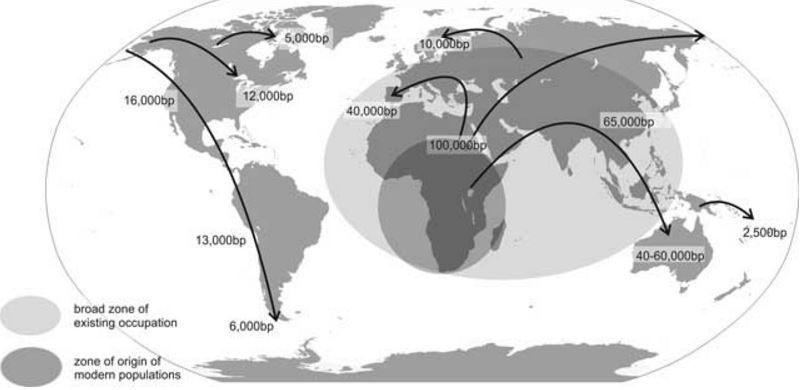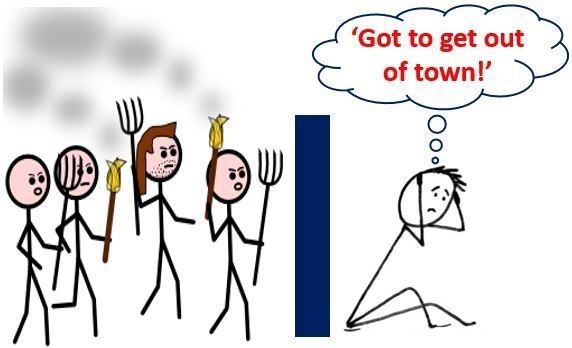Post by UKarchaeology on Nov 27, 2015 14:46:40 GMT
Humans have a treacherous and deceitful dark side, which partly explains why we spread so rapidly across the world, says an archaeologist at the University of York in England. About 100,000 years ago, the speed and character of how humans spread changed considerably, a trend that was due in part to the need for people to leave town because former friends had felt let down or betrayed and had it in for them.
Dr. Penny Spikins, who works at the University’s Department of Archaeology, believes that betrayals of trust were the ‘missing link’ in understand the remarkably rapid spread of our own species around the world.
Before 100,000 years ago, ancient humans were slow and mainly governed by environmental events due to ecological changes or population increases. Afterwards, human populations started spreading amazingly rapidly and across major environmental barriers.

Dispersal pattern of humans after 100,000 BP. (Image: openquaternary.com)
However, Dr. Spikins says these changes are linked to changes in human emotional relationships.
Dr. Spikins writes in the journal Open Quaternary that neither ecological changes nor population increase provide an adequate explanation for the way humans moved into new regions, starting about 100,000 years ago.
We developed a ‘dark side’
She believes that as commitments to others became more vital to survival, and human groups became ever more driven to seek out and punish those who cheated, the ‘dark’ side of our nature also developed.
Moral disputes motivated by a sense of betrayal and broken trust became more common, and encouraged early humans to put distance between them and those they saw as their rivals.
Dr. Spikins says that the emotional bonds which held populations together during crises had a darker side in profound reactions to betrayal which modern humans still feel.

Former friends who felt betrayed drove people (who wanted to survive) out of town.
Full story: marketbusinessnews.com/treacherous-and-deceitful-humans-spread-rapidly-across-the-world/113072
Dr. Penny Spikins, who works at the University’s Department of Archaeology, believes that betrayals of trust were the ‘missing link’ in understand the remarkably rapid spread of our own species around the world.
Before 100,000 years ago, ancient humans were slow and mainly governed by environmental events due to ecological changes or population increases. Afterwards, human populations started spreading amazingly rapidly and across major environmental barriers.

Dispersal pattern of humans after 100,000 BP. (Image: openquaternary.com)
However, Dr. Spikins says these changes are linked to changes in human emotional relationships.
Dr. Spikins writes in the journal Open Quaternary that neither ecological changes nor population increase provide an adequate explanation for the way humans moved into new regions, starting about 100,000 years ago.
We developed a ‘dark side’
She believes that as commitments to others became more vital to survival, and human groups became ever more driven to seek out and punish those who cheated, the ‘dark’ side of our nature also developed.
Moral disputes motivated by a sense of betrayal and broken trust became more common, and encouraged early humans to put distance between them and those they saw as their rivals.
Dr. Spikins says that the emotional bonds which held populations together during crises had a darker side in profound reactions to betrayal which modern humans still feel.

Former friends who felt betrayed drove people (who wanted to survive) out of town.
Full story: marketbusinessnews.com/treacherous-and-deceitful-humans-spread-rapidly-across-the-world/113072
